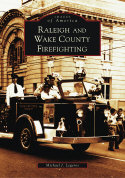| legeros.com > Books > Raleigh & Wake County Firefighting > Introduction |
|
Available at area Barnes & Noble, Borders, Waldenbooks, Book-A-Million, local independent booksellers, gift shops, and museum stores, www.amazon.com, www.barnesandnoble.com, and www.arcadiapublishing.com. Or contact Arcadia's toll-free sales number at 1-888-313-BOOK (2665) IntroductionThe history of fire protection in Wake County, North Carolina is almost as old as the area itself. Planners of the first town- Raleigh, created in 1792 as the new state capital- were well aware of the dangers to wooden structures with minimal water supplies. They created the four principal streets 99 feet wide, and all others within the 5/8-mile town limits 66 feet wide, to prevent fires from spreading between blocks. Early protective ordinances were passed, such as one prohibiting porches, platforms, or other wooden structures from being added to building fronts. As early as 1802, citizens "subscribed" to the purchase price of Raleigh's first fire engine. Alas, the hand-powered pump, capable of throwing 80 gallons of water a minute a distance of 44 yards, was apparently never purchased. Instead, fires were fought by more traditional means-buckets of water or sand, or even with blasting powder, as was used on June 18, 1816, when 51 buildings in the first two blocks of Fayetteville Street burned. City Commissioners ordered all adult males to take turns patrolling the streets in 1813, to apprehend lawbreakers, and "be particular in respect to Fire." City Watch members spotting flames ran to the yard of Casso's Inn at the head of Fayetteville Street and rang a large bell. Citizens were required to rush to the scene with whatever extinguishing materials or firefighting equipment they had. In 1818, the purchase of a fire engine was finally approved, and one year later, a "very complete Fire-Engine from Philadelphia, with a Supply Pump, a sufficient length of Hose, Fire-Hooks, Chain, etc." arrived. A fire company was formed at the same time, led by Raleigh Register editor Joseph Gales. The city had also rushed to complete a system of wooden pipes to convey water into town. It failed and was abandoned a few months after its inauguration. As the fire company had difficulty maintaining a full roster, a law was passed in 1826 allowing the city to draft male citizens for fire service if fewer than 40 volunteered each year. Males could also be fined $5 for failing to assist when the fire alarm sounded. ...continued in the book! |
